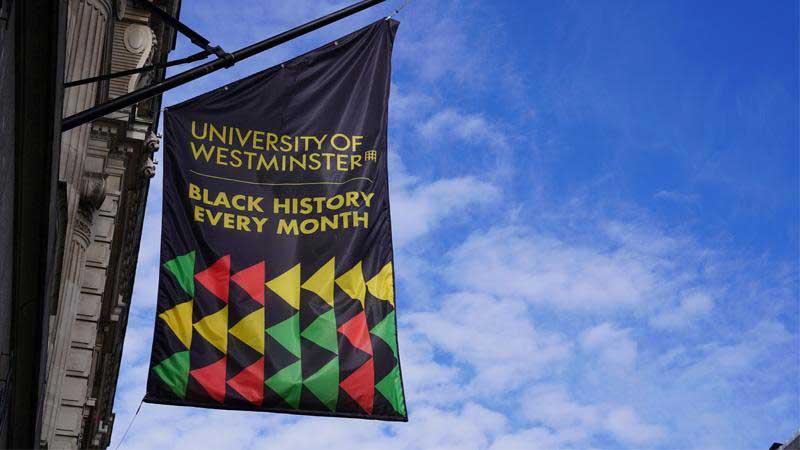In June 2020, the University made a public commitment to anti-racist practice by publishing 15 Black Lives Matter (BLM) Commitments. Each summer since, the University has reported on its progress by reflecting on achievements and challenges. Now, Westminster has launched a refreshed Equality, Diversity and Inclusion (EDI) Strategy for 2025–2030 to confront discrimination and embrace diversity.

The University’s focus is on confronting prejudices and celebrating diversities, with Westminster's anti-racist endeavours being part of its wider EDI work. Among the notable achievements over the past five years are several key milestones.
One is the implementation of the Equality, Diversity and Inclusion (EDI) Strategy 2020-25, which holds anti-racism at its core, and is overseen by the University’s EDI Committee. With wide representation from across the institution, the Committee is responsible for governance, policy, practice and programmes relating to EDI. The Committee makes recommendations to the University Executive Board regarding strategic direction, priorities and objectives, and supports University-wide engagement with EDI to help enable the development and delivery of initiatives and action plans. The Committee regularly monitors EDI data, including diversity in leadership roles, and works with stakeholders and leaders on EDI commitments within education, employability, global engagement and research and knowledge exchange.
From 2021 there have been a series of ambitious EDI programmes, such as Community and Communities: Supporting and Celebrating Diversity and Westminster for All: Equity, Inclusion and Belonging, which are both supported by the Quintin Hogg Trust. The Being Westminster Strategy is unequivocal about the purpose of the University, which is to enable people from every background to fulfil their true potential, a mission supported through these programmes.

Group photo at EDI Open Forum
Another highlight is the annual EDI Open Forum that is supported by colleague networks along with School and Professional Services EDI Leads, and has run since 2020. Each year the event focuses on breaking down silos and building collaboration across the University. Issues that have been a part of Westminster's EDI Strategy have been integral to the agenda of the Forum every year.
Now in its fifth year, Black History Year (BHY) has grown into a year-round programme of events, workshops, writing retreats and initiatives, such as BHY Create, a student empowerment programme, and the BHY Researchers Network, which supports Black PhD student and colleague development. The BHY Research Network continues to move from strength to strength, holding its first annual conference in June 2025.

BHY researchers writing retreat
Another key milestone is the Challenging Racisms Conference. Held in the summer every year since 2021, the conference brings together national voices to address racism in academia and society. The events are open to the public and seek to shape ideas and practices in the higher education sector and beyond. The University’s understanding of racism includes related prejudices such as antisemitism, Islamophobia and casteism, with each always considered intersectionally. The University recognises that the struggle against racisms goes hand-in-hand with the struggle against sexism, queerphobia, ableism and other bigotries.
While reflecting on these successes, the Strategy acknowledges that challenges remain, as decolonising and diversifying education and other aspects of university life are ongoing processes. The work continues towards an anti-racist university by tackling gaps faced by many Black and Asian students, diversifying leadership to reflect the diversity of the University community, and addressing the experiences of some colleagues and students who may still feel marginalised.
In recognition of Westminster’s achievements and challenges, and with the aim to build on them, the University's refreshed EDI Strategy for 2025-2030 sets out a clear vision, providing direction and purpose for the commitment to fairness, representation and belonging, building accountability for continuous improvement across the University. The Implementation Plan that underpins this Strategy will incorporate Westminster’s commitments to anti-racism, aligning actions with business objectives and supporting transformation by embedding equality, inclusion, equity and diversity within its culture and processes.
Professor Dibyesh Anand and Dr Deborah Husbands, Co-Chairs of the University EDI Committee, said: “We have made tremendous progress in five years and have also secured external recognition for some of it. We know that the pace of change is slow and inconsistent and not everyone would feel a sense of progress. To an extent, that is to be expected, given our institution is part of a society marked by diverse experiences, perceptions and inequities. EDI is as much about feelings as it is about data. We are committed to carrying on the work to help our University be a place that is more equitable, challenges racisms, celebrates diversity and promotes inclusion.”
The University of Westminster’s commitment directly contributes to the United Nations Sustainable Development Goals (SDG) 3: Good Health and Wellbeing, 5: Gender Equality and 10: Reduced Inequalities. Since 2019, the University of Westminster has used the SDGs holistically to frame strategic decisions to help students and colleagues fulfil their potential and contribute to a more sustainable, equitable and healthier society.


